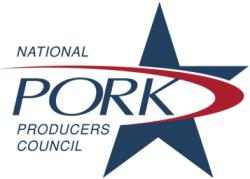 The pork industry was the recipient of negative publicity on the influential CBS 60 Minutes program that aired on Sunday, January 5th. The segment dealt with antibiotic-resistant pathogens associated with pork. Dr. Lance Price, a microbiologist afilliated to George Washington University, Department of Environmental and Occupational Health and who serves as the Director of the Antibiotic Resistance Action Center was a persuasive advocate for restricting administration of antibiotics to livestock. In his interview he was given the opportunity to expound at length on drug resistance and the role of antibiotics, with specific emphasis on pork production.
The pork industry was the recipient of negative publicity on the influential CBS 60 Minutes program that aired on Sunday, January 5th. The segment dealt with antibiotic-resistant pathogens associated with pork. Dr. Lance Price, a microbiologist afilliated to George Washington University, Department of Environmental and Occupational Health and who serves as the Director of the Antibiotic Resistance Action Center was a persuasive advocate for restricting administration of antibiotics to livestock. In his interview he was given the opportunity to expound at length on drug resistance and the role of antibiotics, with specific emphasis on pork production.
Dr. Liz Wagstrom, Chief Veterinarian for The National Pork Producers Council (NPPC), defended the position of her industry. It is apparent from a statement subsequently released by the NPPC that her contribution was heavily edited with a wide disparity in the length of her interview with Lesley Stahl and the duration and content of her contribution to the program aired. So why are they surprised?
 Whether due to editing by CBS or the current philosophy prevailing in the hog industry, Dr. Wagstrom had a difficult time responding to questions justifying the use of antibiotics. What came across as a decidedly defensive approach centered on denying access to farms to health professionals. She “justified” the exclusion citing the consideration of biosecurity. This is a frequently raised defense of doubtful merit. If biosecurity is an important practice in the industry, visitors should be able, subject to decontamination, to enter facilities housing growing hogs. Scientists not having had contact with any livestock or swine pathogens for at least five days are no danger to a herd if they pass through a biosecurity module to disrobe, shower and don farm-provided personal protective clothing. To deny access to responsible media and public health authorities on the grounds of “biosecurity” creates the impression of obstruction and lack of transparency, inviting suspicion and confirming the worst condemnation of “factory farming” depicted on social media.
Whether due to editing by CBS or the current philosophy prevailing in the hog industry, Dr. Wagstrom had a difficult time responding to questions justifying the use of antibiotics. What came across as a decidedly defensive approach centered on denying access to farms to health professionals. She “justified” the exclusion citing the consideration of biosecurity. This is a frequently raised defense of doubtful merit. If biosecurity is an important practice in the industry, visitors should be able, subject to decontamination, to enter facilities housing growing hogs. Scientists not having had contact with any livestock or swine pathogens for at least five days are no danger to a herd if they pass through a biosecurity module to disrobe, shower and don farm-provided personal protective clothing. To deny access to responsible media and public health authorities on the grounds of “biosecurity” creates the impression of obstruction and lack of transparency, inviting suspicion and confirming the worst condemnation of “factory farming” depicted on social media.
Producers of the CBS program erred in not stating that since 2017, routine administration of antibiotics for the purposes of growth promotion ceased in accordance with FDA Industry Guidance. The 60 Minutes program created the perception that this practice continues.
The program represents a number of lessons for the broiler industry. Both with respect to welfare and food safety, it is more beneficial to be proactive than reactive. Although the NCC and USPOULTRY have produced positive videos depicting welfare on farms and have promoted the image of the industry on social media, more can be done to establish rapport with mainstream news and entertainment outlets. Spokespersons for industry associations require training in presentation and should develop the ability to respond positively to questioning by professional interviewers.
The National Pork Producers Council has experienced a ten-year conflict in the media over gestation crates, that are still being defended as a rearguard action. This is despite replacement of confinemnent by the major hog integrators in response to customer and consumer demands. The sentiments expressed by Dr. Wagstrom towards antibiotics reflect an opinion which prevailed in the broiler industry over five years ago. The dependency on antibiotics has now been dispelled by science and practice.
We will continue to face criticism from “big media”. As far as they are concerned, programs that purport to expose a problem, real or spurious and that create anxiety among consumers, generate more eyeballs than topics which are bland and non-controversial. Remember “pink slime”?